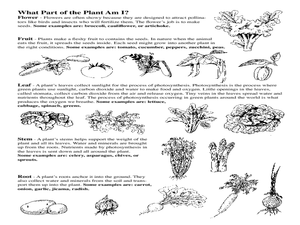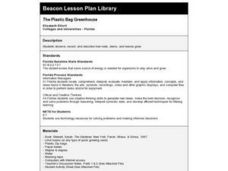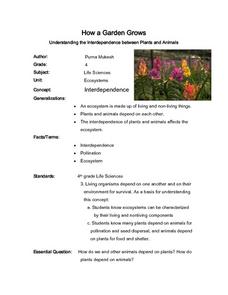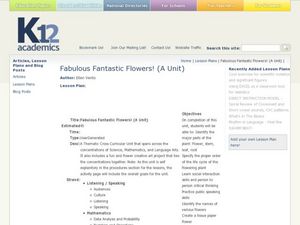American Museum of Natural History
What's This? Gold
Cell phones are likely made of gold—at least part of them! An interesting lesson explains the conventional and not-so-conventional uses of the popular element gold. From the Inca empire to modern-day technology, learners discover gold...
Chicago Botanic Garden
Leaf Litter Ecology Lab
Some organisms spend their entire lives in leaf litter. The third in a series of six is a great lesson exploring the community of leaf litter. Groups gather and then spread leaf litter over white paper and remove leaves/twigs while...
California Academy of Science
Nuclear Energy: What's Your Reaction?
OSHA confirms that rules governing worker safety at nuclear power plants ranks higher than worker safety in offices. Scholars must consider safety, cost, alternatives, and other factors before recommending whether a town should build a...
Curated OER
Plant Party
Young scholars identify plant parts. In this plants lesson, students bring in a vegetable. Each student classifies which part of the plant their vegetable comes from (flower, root, ect.) Young scholars identify the parts of their...
Curated OER
Caterpillar Camouflage
Students list animals, plant parts, and reasons for caterpillars to camouflage themselves. In this animal and plant adaptations lesson plan, students also play a game where they use colors as camouflage.
Curated OER
The Plastic Bag Greenhouse
Third graders observe plants and record their growth. They describe the parts of plants in detail including the roots, stems and leaves.
Curated OER
Introduction To Floral Morphology
Students create a model of the four basic whorls of flowers using a water bottle, construction paper and Q-tips. They then examine fresh flower specimens to see how the basic structure can vary in different species of flowering plants.
Curated OER
Structures Slide Show
Fourth graders investigate basic plant anatomy. They create an effective slide show showing the plant anatomy and life process of a plant of their choice. Students use PowerPoint to create their presentations.
Curated OER
Getting a Handle on Your Bee
Middle schoolers observe dried bees, carefully glue them to toothpicks, and use them for cross pollinating their Brassica plants. They also describe reasons why two similar investigations can produce different results. Finally,...
Curated OER
Looking at Flowers
Young scholars use their bee sticks to cross-pollinate their Fast Plants and also focus in on the anatomy of flowers. They analyze how the parts of a system go together, and how these parts depend on each other. Finally, students...
Curated OER
Pollination Station
Students investigate why and how bees pollinate flowers and other plants. They define pollination, and read and sing along with the song "Yo, i'm a Flower." Students examine a diagram of a flower, simulate bees pollinating flowers, and...
Curated OER
Making Pretzels
Students discover that plants provide food products to humans. In this baking lesson, students grind wheat seeds into flour and then use the flour to make pretzels. Students participate in a variety of activities that involve them in...
Curated OER
Ecology Club
Fifth graders measure their plants and take pictures, write down new
observations about their plants. They discuss taking plants home. When they take them home students carefully put a plastic bag over the top to keep the plants from...
Curated OER
Desinging and Using a Dichotomous Key
Young scholars are examine the purpose of dichotomous keys. In groups, they design their own in order to describe the characteristics of plants and weeds native to California. To end the lesson, they define new terminology associated...
Curated OER
How A Garden Grows
Fourth graders explore the importance of plants to animals and visa versa. After reading a book, The Tree in the Ancient Forest, they explore how plants and animals are independent. Students list living and nonliving things they...
Curated OER
Rain Reasons
Students explore how climatic factors influence the growth of plants. They create an experiment to find how variations in water, light, and temperature affect plant growth and describe how precipitation and geography can affect the...
Curated OER
Forest Ecology
Learners examine the different plants and animals in British Columbia. In this forest ecology lesson students explore how ecosystems work, classify animals and investigate food webs and chains.
Curated OER
Fabulous Fantastic Flowers!
Learners study flowers and identify their major parts. In this flowers lesson plan, students research flowers, learn about their life cycle, label their major parts, and make tissue paper flowers.
Curated OER
Plant Actions
Students explore plant life. In this biology lesson plan, students take part in 2 activities that require them to study photosynthesis and water transport in plants.
Curated OER
Gardening for Beauty, Food, and Enjoyment
First graders create their own garden. In this plant lesson, 1st graders discover the essential elements for a plant to grow. They planted their own garden and read the amount of space needed and the sunlight preferred for each plant.
Curated OER
Fiber of Life
Students examine the importance of plants to individuals and society through a multi-discipline set of activities. They observe and draw different leaf structures and then create a book about trees and photosynthesis. They explore ways...
Curated OER
Life As A Tree
Third graders design a plate to represent the three parts of a tree. In this tree parts lesson plan, 3rd graders learn about the functions of each part and design the plate to resemble the rings of the tree.
Curated OER
Salad Party
Students bring different plant parts in order to make one big salad. They observe each part and classify it.
Curated OER
Cells are 3-D!
Students design three dimensional models of plant and animal cells. They identify the cells parts, and compare animal and plant cells.























